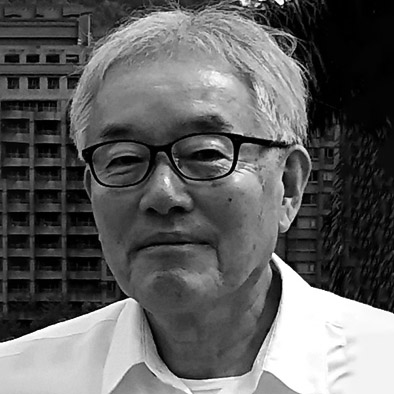パネリスト・モデレーター紹介

清澤 悟 師
Ven. Satoru Kiyosawa
第1セッション
「グローバルコンパクト」
パネリスト
経歴
1947年 11月2日生まれ。1970年 京都大学卒業:建築学。1972年 京都大学大学院終了:都市設計 建築都市設計実務。1977年 ペンシルバニア大学フルブライト奨学金留学:都市設計。1990年 真宗大谷派願得寺住職承継。2008年 東本願寺式務所定衆。
Curriculum Vitae
1947 Born. 1970 Kyoto Univ. Architecture Dept. 1972 Gdaduate School of Archi. Kyoto Univ. Urban Design. 1977 Ulbright Grantee: Univ. of Pennsylvania. Urban Design. 1990 Succeeded Gantokuji. 2008 Chief- Adviser: Ceremonial Dept. Kyoto Higashi-Honganji.
梗概
DC:グローバルコンパクト /SDGs:持続可能な発展
企業・団体へ/人権/労力/環境 腐敗防止
GC・SDGs に対して 精神文化・宗教の役割
GCにおいて、社会に対し掲げられた目標の達成には、即ち、人権、労働、環境、公正と、SDGs社会の持続発展の可能性を考える時、実社会的な種々の取り組みと、精神的(心構え等)な取り組みの両方が必要となりましょう。特に、後者の取り組みに関しては、宗教が果たせる役割は大切であると考えられます。
日本においては伝統的にその精神風土に宗教が果たしてきた役割は多大であり、特に長きに亘っては神道・仏教による影響をあげることができます。近代の宗教研究の碩学である鈴木大拙博士によりますと、それは日本的霊性と定義され、特に鎌倉期以降に普通の日本人大衆に浸透し、根付いた禅宗と浄土宗・浄土真宗であるとされています。この二つの宗派の教えの中で、GCに寄与しうるものとして先ず挙げられるのは、禅における「少欲知足」、浄土真宗における「自然法爾」という境地であります。
禅はこの地においては道元、栄西によって確立され、その教えは日本人の精神にまた生活様式に深く根差しているものであります。仏教における主要な課題である「煩悩」の制御・抑制・克服を、「知足」という境地によって達成しようとするものであり、この「少欲知足」、また人口に膾炙した「吾、唯足るを知る」という気分は爾来、伝統的に日本人が心底に抱いてきたものであり、質素・節約・中庸・謙虚といった日本人の気風特性となっており、これらは、そのままDC・SDGsの要である社会的公正、環境保全調和、節度あるエネルギー消費等々を推進するに望ましい基本的態度に直結すると考えます。
また、法然の浄土宗を受けて親鸞が確立した浄土真宗は特に一般大衆に浸透した宗派であり、その教えは「自然法爾」という言葉にも表されています。「他力」に身をゆだね、自力の計らいを棄て、あるがままの姿かたちであることを受け入れるという境地は、前述の日本人の気風特性に更に、調和・感謝・勤勉・従順・協力といったものを加えたものに繋がってきたと言えます。
こうした日本人が伝統的に伝えてきた気風・精神・生活様式は明治以降の近代化において、また大戦後の近現代において、何某かの痕跡は残すものの、圧倒的な欧米文化の影響によりすっかり薄らいでしまいました。近代のこうした状況に危機感を抱いた文化人の一人であり、精神面と実社会面の両方に於いて警鐘をならした「柳宗悦」は、精神面においては「捨て聖」と言われた、一遍の持つ「無所有性」を高く評価し、実社会面においては、歴史の中で長く相続されてきた優れた手工芸を「民芸」という概念を提示して、その創造的労働のあり方を親鸞の説く「他力道」による創造という実社会と精神・宗教が融合した日本の伝統的人間活動(近代になり失なわれつつある)再評価し、労働と精神と宗教の精華として、全霊をもって励ましその存続に貢献したのであります。こうした「民芸」の表れ方は常に、健康であり素直であり、無名であり、風土的(土着的)即ち土徳を反映したものであり、人々に長く愛され、丈夫で長持ちするものであり、正しくGC・SDGsを体現しているものと言えます。
このように見てくると、今、GC・SDGsに果たすべき、宗教としての役割は、この地においては、本来この国にあった、「知足」、「自然法爾」という境地の再確認と実践であり、心構えとしての、質素・節約・中庸・謙虚・調和・感謝・勤勉・従順・協力といったマインドを、そして、健康、素直、無名、土徳といった環境に和していくアテイテユードを、これまでは、自力優先の現在社会の中でネガティブなものと捉えられ易かったものを反転して、今こそ求められているものであると、ポジテイブに再浸透させていくことことではないでしょうか。
Abstract
* Intention
To attain the goals proposed in GC and SDGs, which are about [human-rights], [labors], [environments[, [justice] and [sustainability] for the society, we will need the two-way approach which are the real-social attempts and the spiritual-religious ones.
Here as for the later spiritual-religious attempts, I would like to propose two Buddhism key-words, [知足TARUWOSIRU] and [自然法爾 JINENHOUNI] and the practical movement [民芸 MINGEI].
* Proposal summary
To attain the goals proposed in GC and SDGs, which are about [human-rights], [labors], [environments[, [justice] and [sustainability] for the society, we will need the two-way approach which are the real-social attempts and the spiritual-religious ones. Especially for the spiritual-religious attempts, the religion will be able to contribute a lot.
In Japan the religion has been taking an important part to cultivate peoples’ domestic spirits, believes, ways of thinking and lives. Especially in its long history Shinto and Buddhism are taking very important parts. In modern era 鈴木大拙DAISETSU SUZUKI great professor and scholar studying Buddhism named this Japanese spiritual characteristic as NIHONTEKI REISEI 日本的霊性 formed by ZEN-SHU and JODO-SHU/JODO-SINSHU which were rooted deeply into ordinary mass-Japanese since KAMAKURA-era, 12th century. In these two Buddhism groups’ teachings we can find key words which can contribute to GC・SDGs, [知足TARUWOSIRU] in Zen and [自然法爾JINENHOUNI] in JODO-SHINSHU.
Zen was established here by 栄西EISAI and 道元DOGEN at that time. And its teachings were rooted deep into Japanese’ way of thinking and life. To cope with dealing [煩悩B- ONNOU] that is main theme for Buddhism reach the ground of [知足TARU-O-SIRU] meaning “ I feel completely satisfied with present situation and seeking nothing more”. To admit this ground cultivated such attitude of simplicity, modesty, saving, moderation and humbleness which are very common among Japanese and very important attitude directly linked for social fairness, environmental protection and modest consumption of energy acclaimed in GC・SDGs.
Succeeding 法然HONEN'S 浄土宗JODO=SHU, 親鸞SHINRAN established 浄土真宗JODO-SHISHU in KAMAKURA-era. It has been occupying big part of ordinary peoples’ mind because of its simplicity and inclusiveness.
One important teaching words are [自然法爾JINENHOUNI] which means whole dep-
endence on [他力TARIKI] and AMIDA, supreme-existence, dumping selfishness and admitting present situation satisfied. This spiritual-ground cultivated such attitude of harmony, thankfulness, diligence, obedience and cooperation which are also very common among Japanese and very important attitude directly linked for social fairness acclaimed in GC and SDGs.
In modern times, such very traditional historical Japanese’ spirit and way of life had been overwhelmed by Western culture rapidly and been declining.
In early 20th century MUNEYOSHI YANAGI, great intellectual, cautioned this decl- ining in both real-social and spiritual side. He picked up and acclaimed [一遍 IPPEN] whose attitude of no-interests for properties [捨て聖 STEHIJIRI] as an very important way of life. And in real-social side, he insisted the concept of [民芸 MINGEI] which is a very traditional Japanese handicrafts as the ideal labor-success created through real-social and spiritual-religious labors. He found there craftsman’s very diligent and religious attitude relying on TARIKI. So [民芸 MINGEI] are always beautiful, healthy, anonymous, vernacular[土徳 DOTOKU], strong and sustainable. Those characters are exactly fit to the concept of GC・SDGs in terms of labor, justice, environment and sustainability.
Thus we, related to spiritual and religious side, again have to make efforts to persuade those very special Japanese spirit, attitude and way of life traditionally being succeeded historically, which are apt to be considered “negative” in present very selfish and offensive world, as the most important and urgently-needed now.
